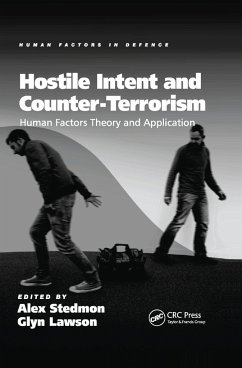Hostile Intent and Counter-Terrorism
Human Factors Theory and Application
Herausgeber: Lawson, Glyn; Stedmon, Alex
Hostile Intent and Counter-Terrorism
Human Factors Theory and Application
Herausgeber: Lawson, Glyn; Stedmon, Alex
- Broschiertes Buch
- Merkliste
- Auf die Merkliste
- Bewerten Bewerten
- Teilen
- Produkt teilen
- Produkterinnerung
- Produkterinnerung
This volume brings together research from around the world to explore a range of topics within the project of detecting terrorist activities. It is divided into six key themes: conceptualising terrorism, deception and decision making, social and cultural factors in terrorism, modelling hostile intent, strategies for counter-terrorism, and future directions. Twenty four chapters explore the spectrum of detecting terrorist activities, hostile intent, crowded public spaces and suspicious behaviour. A variety of disciplines are represented, including ergonomics/human factors, psychology,…mehr
Andere Kunden interessierten sich auch für
![Ethics, Politics, and Whistleblowing in Engineering Ethics, Politics, and Whistleblowing in Engineering]() Ethics, Politics, and Whistleblowing in Engineering73,99 €
Ethics, Politics, and Whistleblowing in Engineering73,99 €![A Moral Military A Moral Military]() Sidney AxinnA Moral Military35,99 €
Sidney AxinnA Moral Military35,99 €![Beyond the Code Beyond the Code]() Heidi FureyBeyond the Code71,99 €
Heidi FureyBeyond the Code71,99 €![Mediterranean Cruise of the U.S.S. Chester: a Story of a Queen of the Seas, Its First Crew, Its First Voyage, and of Its Sister Ships of the 10,000-to Mediterranean Cruise of the U.S.S. Chester: a Story of a Queen of the Seas, Its First Crew, Its First Voyage, and of Its Sister Ships of the 10,000-to]() Samuel Wheeler BeachMediterranean Cruise of the U.S.S. Chester: a Story of a Queen of the Seas, Its First Crew, Its First Voyage, and of Its Sister Ships of the 10,000-to24,99 €
Samuel Wheeler BeachMediterranean Cruise of the U.S.S. Chester: a Story of a Queen of the Seas, Its First Crew, Its First Voyage, and of Its Sister Ships of the 10,000-to24,99 €![The Peaks of Lyell The Peaks of Lyell]() Geoffrey BlaineyThe Peaks of Lyell25,99 €
Geoffrey BlaineyThe Peaks of Lyell25,99 €![On to Suez!: The Story of De Lesseps and the Canal On to Suez!: The Story of De Lesseps and the Canal]() On to Suez!: The Story of De Lesseps and the Canal24,99 €
On to Suez!: The Story of De Lesseps and the Canal24,99 €![The Engineering Experiment Station of the University of Illinois The Engineering Experiment Station of the University of Illinois]() The Engineering Experiment Station of the University of Illinois15,99 €
The Engineering Experiment Station of the University of Illinois15,99 €-
-
-
This volume brings together research from around the world to explore a range of topics within the project of detecting terrorist activities. It is divided into six key themes: conceptualising terrorism, deception and decision making, social and cultural factors in terrorism, modelling hostile intent, strategies for counter-terrorism, and future directions. Twenty four chapters explore the spectrum of detecting terrorist activities, hostile intent, crowded public spaces and suspicious behaviour. A variety of disciplines are represented, including ergonomics/human factors, psychology, criminology, cognitive science, sociology, political theory, engineering and computer science.
Produktdetails
- Produktdetails
- Verlag: CRC Press
- Seitenzahl: 390
- Erscheinungstermin: 17. Oktober 2019
- Englisch
- Abmessung: 231mm x 152mm x 23mm
- Gewicht: 499g
- ISBN-13: 9780367377854
- ISBN-10: 0367377853
- Artikelnr.: 58058916
- Verlag: CRC Press
- Seitenzahl: 390
- Erscheinungstermin: 17. Oktober 2019
- Englisch
- Abmessung: 231mm x 152mm x 23mm
- Gewicht: 499g
- ISBN-13: 9780367377854
- ISBN-10: 0367377853
- Artikelnr.: 58058916
Dr Alex W Stedmon FIEHF CPsychol CSci FRSA is a Chartered Psychologist, Fellow of the Institute of Ergonomics and Human Factors and Fellow of the Royal Society of Arts. He is a Reader in Human Factors at Coventry University. He worked for the Ministry of Defence before moving into academia and explores human factors issues of technology use in security applications as well as contextual methods for investigating suspicious behaviours in various security related domains. Alex was one of the technical leads for a strategic security consortium (EPSRC project: 'Shades of Grey') and received Centre for Defence Enterprise funding for projects on: human factors of automated CCTV; identifying human pheromones associated with deception; and collaborative intelligence information gathering. Alex has co-edited special issues of 'Applied Ergonomics' (44/2013: 'Detecting terrorist activities: Hostile intent and suspicious behaviours') and 'The Journal of Police & Criminal Psychology' (28(2)/2013: 'Terrorism psychology: Theory and application'). Dr Glyn Lawson FIEHF - is a Lecturer within the Faculty of Engineering and a member of the Human Factors Research Group at The University of Nottingham. His research expertise includes the human-centred development of new technologies in design and engineering applications. Glyn has particular expertise in the evaluation of methods for predicting behaviour in emergency situations. He has also conducted research on deception detection and worked on requirements capture within the Security domain. Glyn is a Fellow of the Institute of Ergonomics and Human Factors and sits on the Education and Training panel. Glyn also co-edited the special issues of 'Applied Ergonomics' and 'The Journal of Police & Criminal Psychology' focusing on detecting terrorist activities and terrorism psychology.
Contents:Foreword,Preface,Hostile intent and counter-terrorism: strategic
issues and the research landscape. Part 1 Conceptualising Terrorism: The
role of fear in terrorism; Understanding terrorism through criminology?
Merging crime control and counter-terrorism in the UK; Analysing the
terrorist brain: neurobiological advances, ethical concerns and social
implications; Ethical issues in surveillance and privacy. Part 2 Deception
and Decision-Making: Non-verbal cues to deception and their relationship to
terrorism; Deception detection in counter-terrorism, ; A field trial to
investigate human pheromones associated with hostile intent; On the trail
of the terrorist: a research environment to simulate criminal
investigations. Part 3 Modelling Hostile Intent: Safety and security in
rail systems: drawing from the prevention of railway suicide and trespass
to inform security interventions; Tackling financial and economic crime
through strategic intelligence management; Competitive adaptation in
militant networks: preliminary findings from an Islamist case study;
Evaluating emergency preparedness: using responsibility models to identify
vulnerabilities. Part 4 Sociocultural Factors: Unintended consequences of
the `War on Terror': home-grown terrorism and conflict-engaged citizens
returning to civil society; Parasites, energy and complex systems:
generating novel intervention options to counter recruitment to suicide
terrorism; Terrorist targeting of schools and educational establishments;
Female suicide terrorism as a function of patriarchal societies. Part 5
Strategies and Approaches for Counter-Terrorism: Designing visible
counter-terrorism interventions in public spaces; A macro-ergonomics
perspective on security: a rail case study; Deception and speech: a
theoretical overview to inform future research; Evaluating
counter-terrorism training using behavioural measures theory. Part 6 Future
Directions: Hostile intent and counter-terrorism: future research themes
and questions. Index.
issues and the research landscape. Part 1 Conceptualising Terrorism: The
role of fear in terrorism; Understanding terrorism through criminology?
Merging crime control and counter-terrorism in the UK; Analysing the
terrorist brain: neurobiological advances, ethical concerns and social
implications; Ethical issues in surveillance and privacy. Part 2 Deception
and Decision-Making: Non-verbal cues to deception and their relationship to
terrorism; Deception detection in counter-terrorism, ; A field trial to
investigate human pheromones associated with hostile intent; On the trail
of the terrorist: a research environment to simulate criminal
investigations. Part 3 Modelling Hostile Intent: Safety and security in
rail systems: drawing from the prevention of railway suicide and trespass
to inform security interventions; Tackling financial and economic crime
through strategic intelligence management; Competitive adaptation in
militant networks: preliminary findings from an Islamist case study;
Evaluating emergency preparedness: using responsibility models to identify
vulnerabilities. Part 4 Sociocultural Factors: Unintended consequences of
the `War on Terror': home-grown terrorism and conflict-engaged citizens
returning to civil society; Parasites, energy and complex systems:
generating novel intervention options to counter recruitment to suicide
terrorism; Terrorist targeting of schools and educational establishments;
Female suicide terrorism as a function of patriarchal societies. Part 5
Strategies and Approaches for Counter-Terrorism: Designing visible
counter-terrorism interventions in public spaces; A macro-ergonomics
perspective on security: a rail case study; Deception and speech: a
theoretical overview to inform future research; Evaluating
counter-terrorism training using behavioural measures theory. Part 6 Future
Directions: Hostile intent and counter-terrorism: future research themes
and questions. Index.
Contents:Foreword,Preface,Hostile intent and counter-terrorism: strategic
issues and the research landscape. Part 1 Conceptualising Terrorism: The
role of fear in terrorism; Understanding terrorism through criminology?
Merging crime control and counter-terrorism in the UK; Analysing the
terrorist brain: neurobiological advances, ethical concerns and social
implications; Ethical issues in surveillance and privacy. Part 2 Deception
and Decision-Making: Non-verbal cues to deception and their relationship to
terrorism; Deception detection in counter-terrorism, ; A field trial to
investigate human pheromones associated with hostile intent; On the trail
of the terrorist: a research environment to simulate criminal
investigations. Part 3 Modelling Hostile Intent: Safety and security in
rail systems: drawing from the prevention of railway suicide and trespass
to inform security interventions; Tackling financial and economic crime
through strategic intelligence management; Competitive adaptation in
militant networks: preliminary findings from an Islamist case study;
Evaluating emergency preparedness: using responsibility models to identify
vulnerabilities. Part 4 Sociocultural Factors: Unintended consequences of
the `War on Terror': home-grown terrorism and conflict-engaged citizens
returning to civil society; Parasites, energy and complex systems:
generating novel intervention options to counter recruitment to suicide
terrorism; Terrorist targeting of schools and educational establishments;
Female suicide terrorism as a function of patriarchal societies. Part 5
Strategies and Approaches for Counter-Terrorism: Designing visible
counter-terrorism interventions in public spaces; A macro-ergonomics
perspective on security: a rail case study; Deception and speech: a
theoretical overview to inform future research; Evaluating
counter-terrorism training using behavioural measures theory. Part 6 Future
Directions: Hostile intent and counter-terrorism: future research themes
and questions. Index.
issues and the research landscape. Part 1 Conceptualising Terrorism: The
role of fear in terrorism; Understanding terrorism through criminology?
Merging crime control and counter-terrorism in the UK; Analysing the
terrorist brain: neurobiological advances, ethical concerns and social
implications; Ethical issues in surveillance and privacy. Part 2 Deception
and Decision-Making: Non-verbal cues to deception and their relationship to
terrorism; Deception detection in counter-terrorism, ; A field trial to
investigate human pheromones associated with hostile intent; On the trail
of the terrorist: a research environment to simulate criminal
investigations. Part 3 Modelling Hostile Intent: Safety and security in
rail systems: drawing from the prevention of railway suicide and trespass
to inform security interventions; Tackling financial and economic crime
through strategic intelligence management; Competitive adaptation in
militant networks: preliminary findings from an Islamist case study;
Evaluating emergency preparedness: using responsibility models to identify
vulnerabilities. Part 4 Sociocultural Factors: Unintended consequences of
the `War on Terror': home-grown terrorism and conflict-engaged citizens
returning to civil society; Parasites, energy and complex systems:
generating novel intervention options to counter recruitment to suicide
terrorism; Terrorist targeting of schools and educational establishments;
Female suicide terrorism as a function of patriarchal societies. Part 5
Strategies and Approaches for Counter-Terrorism: Designing visible
counter-terrorism interventions in public spaces; A macro-ergonomics
perspective on security: a rail case study; Deception and speech: a
theoretical overview to inform future research; Evaluating
counter-terrorism training using behavioural measures theory. Part 6 Future
Directions: Hostile intent and counter-terrorism: future research themes
and questions. Index.








